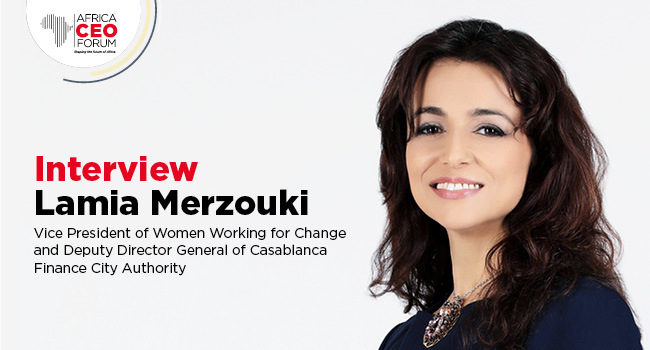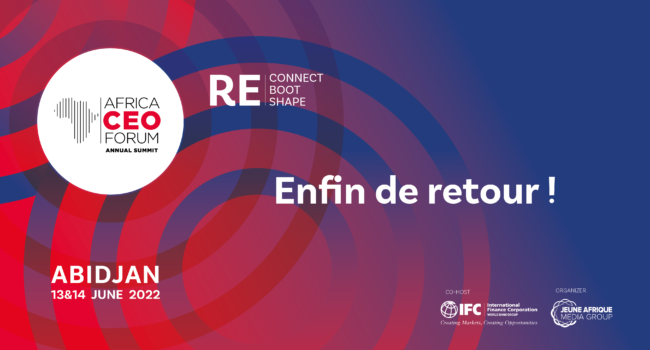
During a digital event on December 2, 2021, organized by the AFRICA CEO FORUM in partnership with Unesco, six experts from the sector discussed the future of artificial intelligence on the continent.
The global market for artificial intelligence (AI) is expected to reach $190 billion by 2025 and even $267 billion by 2027. An exponential growth that shows the impact that AI innovations will have on businesses. The African private sector is no exception. “African private companies are mirroring global trends, with some industries innovating at a faster pace than elsewhere,” says Lana Graf, an artificial intelligence expert at IFC.
However, despite the opportunities for growth and adoption, there are still major constraints to democratising this technology. Access to optimized data, platforms and cloud management systems, especially for SMEs, remain problematic. “AI is, in fact, most effective when the right set of data is available and can be strategically aggregated,” says Leonida Mutuku, researcher, data usage expert, and founder and CEO of Intelipro.
Making AI accessible to African SMEs
Initiatives around shared data infrastructure are among the ways to address these challenges. As data is a non-rival resource (i.e. consumed without decreasing the amount available), companies could share datasets to help all players involved create multiple products, services or production methods simultaneously. This way industry can fully exploit the value of data. Several SMEs could thus use shared data sets, while addressing the different markets and economic opportunities present on the continent. This is already being done by the University of the Witwatersrand in Johannesburg through the AI Africa Consortium, which aims to develop a collaborative network focused on studying AI development and its applications in research and innovation.
To foster its development across the continent, other prerequisites will be necessary such as infrastructure, connectivity, affordability and technical skills acquisition – for which government support will be needed. Without a clear policy strategy on AI, there is no chance that an AI friendly ecosystem will become accessible to companies.
“Policymakers tend to be skeptical about emerging technologies,” warns Fatim Cissé, founder of Dux Côte d’Ivoire, a service provider facilitating access to AI for African companies. Cissé, who is also managing director of IHS Towers Côte d’Ivoire, a telecom infrastructure provider adds “they do not always have the expertise to identify areas where AI could bring real added value to private companies”. Notably because of the multiplicity of its possible applications for the private sector.
Regulating… but not too much
Conversely, it is essential for regulators to devise consumer safeguards against AI misuse. As UNESCO explains in its first-ever global agreement on the ethics of artificial intelligence, “the implementation of these values requires concrete policies,” says Gabriella Ramos, Assistant Director-General for Social and Human Sciences at UNESCO. However, overly rigid regulatory systems applied at too early a stage could hinder the growth of AI innovations.
Inaction by African governments could prove costly to the performance of private companies and societies in general. Bias-based technologies generate biased algorithms and products. The underrepresentation of women in the field of artificial intelligence is already creating gender-biased algorithms that are widening the gender gap in private companies on the continent. Currently, women make up only about 22% of artificial intelligence professionals.
Teaching technical skills, especially to young people, is one of the most effective solutions to overcome the ethical challenges posed by AI. Bringing the right AI skills to young people needs to be “a pan-African conversation and a conversation led by the private sector,” says Stephan-Eloïse Gras, President of Digital Africa, a French initiative for innovation in Africa. The private sector can set ethical standards by raising awareness in schools and partnering with institutions to align its needs with the educational requirements of young people. This is especially the case in certain niches where AI tends to evolve more rapidly than in other sectors and where the education system cannot keep up with the speed of change as some companies do.
The most successful niches can only be identified by asking the right questions: what are the strengths of African economies? What are the most pressing needs of our communities? “Here, research shows that agriculture and mining are among our greatest strengths on the continent and that African companies hold a significant share of the world’s resources,” says Uche Ogboi, managing director of Lori Systems Corp.



